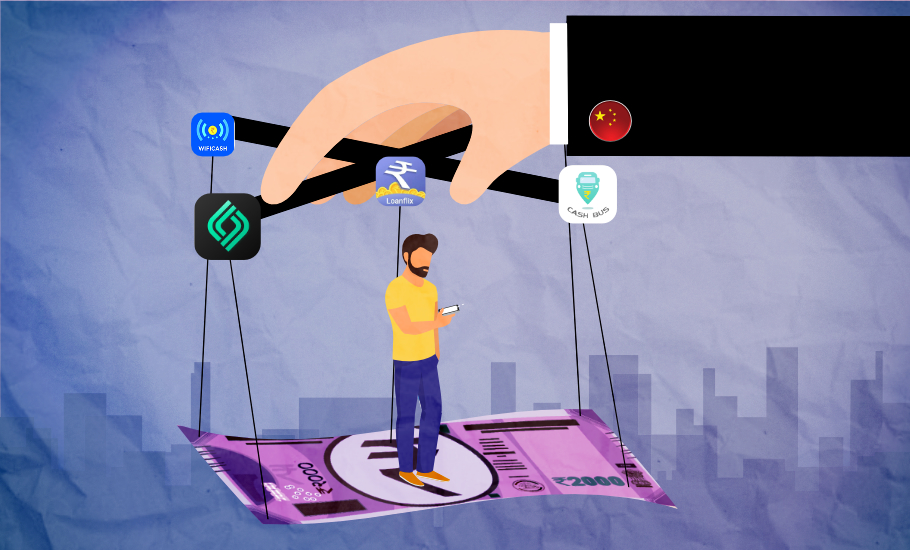
Young pros, blue-collared workers targets of illegal loan apps
The Telangana and Karnataka police have acted tough on money lending platforms after a series of harassment cases of harsh recovery practices allegedly led borrowers to commit suicide.

The Telangana and Karnataka police have acted tough on money lending platforms after a series of harassment cases of harsh recovery practices allegedly led borrowers to commit suicide.
In the past two weeks, the Hyderabad police nabbed 16 people on the basis of harassment cases filed by borrowers and their family members.
Different police teams arrested company representatives across cities — Hyderabad, Gurgaon, Haryana, Bangalore and Delhi — for hiring call centre workers to persuade, harass and intimidate loan defaulters.
The Hyderabad police, on December 30, arrested a Chinese national named Zhu Wei at the Delhi airport while he was trying to leave the country. Wei headed the operations at four different lending platforms run by Aglow Technologies Pvt Ltd, Nabloom Technologies Pvt Ltd, Liufang Technologies Pvt Ltd, and Pinprint Technologies Pvt Ltd, the police said.
Another person, a native of Kurnool district of Andhra Pradesh, was arrested for playing a key role in managing the call centres.
A preliminary investigation by the Hyderabad police into the financial transactions revealed that 1.4 crore transactions were conducted, involving ₹21,000 crore, in the past six months.
“A bulk of these transactions happened over payment gateways and bank accounts linked to these companies. A large number of international transactions were done using bitcoins,” the police revealed.
Over the last fortnight, four people died by suicide after being harassed by loan recovery agents. On December 18, DMN Santhosh Kumar, 36, a working professional in Ramagundam, Telangana, attempted suicide after being harassed by the staff of digital lending platforms. He died five days later. The victim had taken a total loan of ₹51,000 from five different lending platforms. While he had repaid two loans, the rest were pending. On December 18, Kumar recorded a video of himself stating that he was being harassed by these companies as he could not repay the loans.
P Sunil, a 29-year-old IT professional from Hyderabad, became jobless after the pandemic struck. He died by suicide following similar harassments by lending companies. The lending firm representatives had threatened him and blackmailed him saying they would “shame him before his family and friends using social media platforms like WhatsApp”, the police said.
The instant app-based lending companies offer loans to individuals at the click of a button, but levy huge interests and hidden charges that are not communicated to the borrowers at the time of borrowing. If one fails to repay the loan, the companies resort to harassment tactics and abusive practices to get their money back.
The digital lending platforms often target young professionals and blue-collared workers without access to mainstream banks for loans. The companies offer their services across cities and their reach has increased in the wake of the pandemic that caused immense economic distress.
The Federal had reported in June how some lending apps violated Reserve Bank of India (RBI) guidelines and charged exorbitant interests and resorted to harsh recovery practices.
Lending platforms like CashBus, CashBean, InstaMoney, Moneed, Robocash, Cashmama, WifiCash, Moneed, Kissht, Loanflix, among others, disburse loans at the click of a button and target unbanked and underbanked population.
Also read: How app-based lenders are harassing, sucking borrowers dry
The app-based platforms grant loans not based on their credit worthiness but based on their Aadhaar, PAN card and popularity on social networks.
Though there are laws governing money lending that prohibit charging of exorbitant interest rates, with the lack of checks and cap on interest rates, the companies brazenly exploit the customers.
The police said some of the companies charge interest rates varying from 25-40 per cent with processing fees ranging from 15 to 20 per cent. Some even charge one percent interest (365 per cent annually) per day on the principal amount for delayed payments.
The Cyber Crime Division, CID, Karnataka, last week blocked access to over 100 illegal loan apps. “We appeal to citizens to not fall prey to such apps and report to us in case they have (already) fallen into this vicious trap,” the Cyber Crime Division police said.
Also read: RBI raps lending apps, NBFCs for harassing customers
Explaining their modus operandi, the police tweeted saying fraudsters lure customers via SMS to download apps promising instant loans. Once installed, the apps obtain access to contacts, photos and other information on the borrower’s phone. In case of default, the users are harassed by sending defamatory messages to all of their contacts.
Following media reports, the RBI in June fine-tuned the regulations and warned these companies against resorting to illegal practices. Many of these platforms were backed by Chinese players and they partnered with India’s licensed NBFCs to exploit the market. The central bank directed them to adhere to the RBI’s Fair Practices Code guidelines in letter and spirit.
“They must also meticulously follow regulatory instructions on outsourcing of financial services and IT services.” the RBI note said. “Any violation in this regard by banks and NBFCs (including NBFCs registered to operate on ‘digital-only’ or on digital and brick-mortar channels of delivery of credit) will be viewed seriously.”

